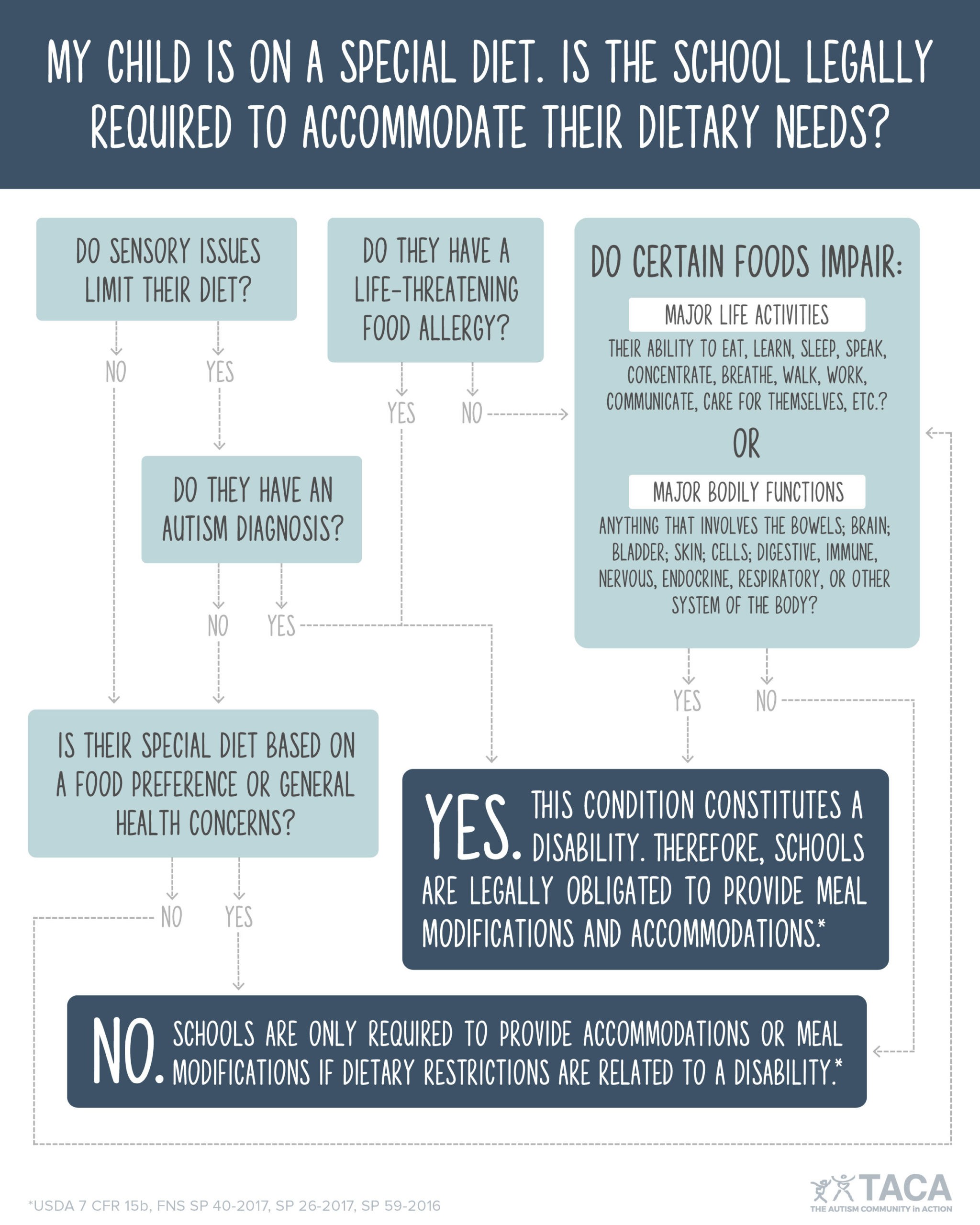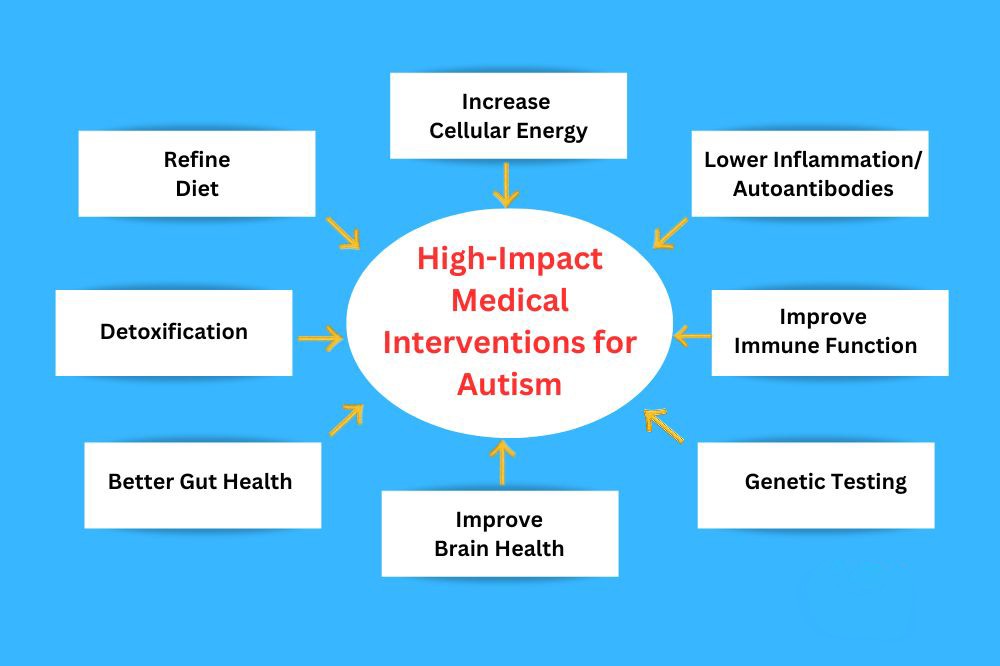Must Schools Provide Meal Modifications For Students On Special Diets?

All contents of this resource were created for informational purposes only and are not intended to be a substitute for professional advice, diagnosis, or treatment. Always seek the advice of your physician, therapist, or other qualified health providers with any questions or concerns you may have.
Federal laws and regulations require public schools to provide meal modifications through the cafeteria service, at no additional cost, to children whose disability restricts their diet. This includes children with autism who are on special diets due to food allergies, sensitivities, or sensory issues. In this article, we will discuss:
- How students with dietary restrictions qualify for special meals through cafeteria services.
- What information schools need to begin providing meal modifications.
- The school’s obligations in regards to providing special meals for students who qualify.
Qualifying for Meal Modifications and Accommodations
Schools that participate in a federal Food and Nutrition Service (FNS) program are under a legal obligation to make accommodations for children who cannot eat school meals because of a disability. Therefore, in order to get the school to provide meals that your child can eat, you need to prove that your child’s condition meets the definition of a disability. Fortunately, this is relatively easy for most autism families to prove.
In fact, dietary restrictions due to sensory issues, food allergies, food sensitivities, or any other medical issue constitute a disability under the Americans with Disabilities Act (ADA).
This is because, in 2008, the ADA broadened the definition of “disability” to include any physical or mental impairment that substantially limits a major life activity or major bodily function of an individual.
Major Life Activities
- According to the ADA, major life activities include eating, sleeping, walking, caring for oneself, speaking, learning, reading, concentrating, thinking, communicating, working, performing manual tasks, and more.
- Therefore, a child with autism can qualify under this definition if sensory issues prevent them from eating foods with certain textures, temperatures, colors, or smells. This is because their autism impacts their ability to perform the major life activity of eating.
Major Bodily Functions
- Furthermore, major life activities include any major bodily functions that involve the bowels; bladder; brain; skin; cells; immune, respiratory, nervous, endocrine, cardiovascular, digestive, or reproductive systems of the body.
- Hence, your child can qualify under this stipulation if certain foods cause them to experience gastrointestinal pain, interfere with their ability to concentrate or learn, cause a mast cell reaction, etc.
When discussing how your child qualifies for food accommodations and modifications with the school, please keep the following in mind:
- Physical or mental impairments do not have to be life-threatening.
- If the impairments your child experiences are temporary or episodic, the school must provide reasonable modifications.
- This stipulation may help kids who suffer from chronic underlying infections like PANDAS/PANS.
- Dietary restrictions based on general health concerns do not qualify as a disability.
- In other words, the school is under no obligation to provide organic food options for your child.

Medical Statement
In order to provide modifications for your child, the school may request a medical statement from his/her doctor. Typically, medical statements must meet the following requirements:
- Be signed by a licensed healthcare professional in your state.
- Include specific information, such as:
- Your child’s disability.
- What major life activity/activities it affects (bowels, cognition, speech, behavior, etc.).
- The reason why your child’s disability restricts their diet.
- Foods to be omitted from your child’s diet
- Choice of foods for substitution
- IEP considerations (see below)
- Your child’s disability.
If your child’s IEP already includes the information above, you do not need to provide a separate medical statement.
Likewise, medical statements do not need to be updated on an annual basis as long as the school has a document on file that reflects your child’s current dietary needs.
Most importantly, schools cannot ask for medical records or medical charts as part of the medical statement.
Regulations Schools Must Follow When Providing Meal Modifications

If your child participates in a school meal program, and they meet the conditions mentioned above, the school must provide a safe meal for them at no additional cost.
When making food modifications, schools:
- Cannot base decisions on stereotypes or what works for other individuals with the same condition.
- For example, suppose the gluten content in Cheerios causes gastrointestinal issues for your child. In this scenario, the school cannot claim it’s acceptable to serve your child Cheerios because another student with gluten sensitivities/allergies eats them without issues.
- Must ensure all foods they provide are free from harmful ingredients.
- If a food’s ingredients are unknown, they cannot serve it to your child.
- Furthermore, they must work to prevent exposure to allergens through cross-contact by the use of proper storage, preparation, and cleaning techniques.
- For example, the school must prepare and cook gluten-free items in a dedicated area and serve the meal with clean gloves.
- However, meals provided by the school do not need to mirror what’s on the menu for other students. Rather, they simply must accommodate your child’s needs.
- To demonstrate, if spaghetti with whole wheat pasta and meat sauce is on the “regular” menu, the school can serve your child a turkey sandwich on gluten-free bread.
- Also, schools participating in an Offer Versus Serve (OVS) program cannot eliminate a specific food component from the program for your child.
- For example, the school must provide a whole grain option for children who cannot eat gluten.
- Must provide a safe environment for your child to consume their meal.
- Cannot charge children with disabilities extra fees for modified meals.
- Even though allergy-safe foods may cost more to prepare, schools cannot charge children with disabilities more than they charge other children for meals.
FAQs
Below you will find answers to questions parents frequently ask us about dietary restrictions at schools.
Can the school deny a request?
Yes, but only in very rare circumstances. For instance, the school can deny your request if the modification is so drastic that it would fundamentally alter the nature of the school’s meal program. However, even in this circumstances, the school must meet specific USDA procedural safeguard requirements to deny your request.
To learn more, please read Accommodating Children with Disabilities in the School Meal Program from the USDA.
Is a food sensitivity or aversion really considered a disability? Even if it’s not life-threatening?
Yep. According to the ADA, any impairment that impacts a major bodily function or major life activity constitutes a disability.
Also, a child with autism who only eats certain foods due to sensory issues or “restricted, repetitive patterns of behavior, interests, or activities,” they qualify for meal modifications through the cafeteria. This is because autism is a disability according to the ADA.
Does the school need a medical statement before they can begin making meal modifications for my child?
Does the school need a medical statement before they can begin making meal modifications for my child?
No. In fact, the USDA regulations explicitly state that schools should not unduly delay a child’s meal modification while waiting for the family to submit a medical statement.
Is the school responsible for adhering to my child’s diet outside of the cafeteria?
Yes! Federal laws and regulations protect students with dietary restrictions throughout the school, including the classroom, nonacademic, and school-sponsored activities. However, these protections exist only if your child’s dietary restrictions are written into their IEP or 504.
Can I ask the school to include goals and accommodations relating to my child’s special diet in their IEP?
Absolutely! To learn more, please read Tips for Including Dietary Restrictions in Your Child’s IEP.
I know the school has to provide a safe lunch for my child to eat, but what about breakfast?
It depends. Federal law does not require schools to provide meals to children with disabilities beyond the meals they offer to other children. So, if your school already participates in the School Breakfast Program (SBP), they must provide a safe breakfast for your child to eat. But, if your child’s school doesn’t already participate in the SBP, they don’t have to begin doing so.
However, if your child’s IEP indicates the school is responsible for providing breakfast for them, the school may ask the SFA (school food authority) to handle this responsibility.
Please see the USDA’s Policy Memorandum on Modifications to Accommodate Disabilities in the School Meal Programs for more information.
Am I responsible for purchasing ingredients for my child’s meals?
No. Every school district has food service personnel they employ to obtain items for school meals. Since schools do not require parents of children without disabilities to purchase their children’s food, they cannot require you to.
Can I request that the school use certain brands when preparing meals for my child?a
Sure, but they are only obligated to fulfill your request when the brand name item is medically necessary.
Conclusion
In summary, federal law requires public schools to provide allergen-free foods through the cafeteria service, at no additional cost, to children whose disability restricts their diet. With the ADA’s expanded definition of disability, most physical and mental impairments now constitute a disability. This means that children on the autism spectrum who are on special diets due to sensory issues, food allergies, or food sensitivities qualify for meal modifications and accommodations at public schools.
Additional Resources
Further Reading:
- Tips for Including Dietary Restrictions in Your Child’s IEP
- An Essential Handout For Teachers & Aides
- Introduction to the Gluten-Free, Casein-Free, Soy-Free Diet
- Going GFCFSF in 10 Weeks!
Federal Laws and Regulations that Protect Children with Disabilities Who Have Dietary Restrictions:
- USDA’s Accommodating Children with Disabilities in the School Meal Programs
- USDA’s Regulatory Requirements for Implementing Section 504 of the Rehabilitation Act (7 CFR Part 15b)
- Rehabilitation Act of 1973: law prohibiting discrimination on the basis of disability in any Federal Government program that receives federal financial assistance.
- Americans with Disabilities Act (ADA): states that federal financial assistance recipients must make reasonable modifications to accommodate children with disabilities.
- Title II prohibits discrimination based on disability in State and local government services, including services provided by public schools.
- Title III prohibits discrimination based on disability by private entities offering public accommodations, including private schools.
- The ADA Amendments Act of 2008: broadened the definition of disability in favor of coverage to the maximum extent permitted. As a result, most physical and mental impairments constitute a disability now.
- IDEA: requires schools to take steps to ensure children with disabilities have an equal opportunity to benefit from extracurricular services/activities. This includes meals.
- IDEA requirements may impact the service of meals outside of federal Food and Nutrition Service (FNS) requirements.
- Schools must provide any nutrition-related service included in a child’s IEP at public expense and at no cost to the child’s family.




